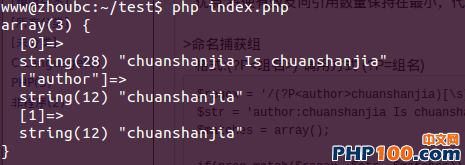echo "n";
字符宽度:零
验证零字符代
$regex = '/HE(?=L)LO/i';
$str = 'HELLO';
$matches = array();
if(preg_match($regex, $str, $matches)){
var_dump($matches);
}
echo "n";
打印不出结果!
$regex = '/HE(?=L)LLO/i';
$str = 'HELLO';
$matches = array();
if(preg_match($regex, $str, $matches)){
var_dump($matches);
}
echo "n";
能打印出结果!
说明:(?=L)意思是HE后面紧跟一个L字符。但是(?=L)本身不占字符,要与(L)区分,(L)本身占一个字符。
捕获数据
没有指明类型而进行的分组,将会被获取,供以后使用。
指明类型指的是通配符。所以只有圆括号起始位置没有问号的才能被捕捉。
在同一个表达式内的引用叫做反向引用。
调用格式: 编号(如1)。
$regex = '/^(Chuanshanjia)[ws!]+1$/';
$str = 'Chuanshanjia thank Chuanshanjia';
$matches = array();
if(preg_match($regex, $str, $matches)){
var_dump($matches);
}
echo "n";
避免捕获数据
格式:(?:pattern)
优点:将使有效反向引用数量保持在最小,代码更加、清楚。
命名捕获组
格式:(?P<组名>) 调用方式 (?P=组名)
$regex = '/(?P
$str = 'author:chuanshanjia Is chuanshanjia';
$matches = array();
if(preg_match($regex, $str, $matches)){
var_dump($matches);
}
echo "n";
运行结果

惰性匹配(记住:会进行两部操作,请看下面的原理部分)
格式:限定符?
原理:"?":如果前面有限定符,会使用最小的数据。如“*”会取0个,而“+”会取1个,如过是{3,5}会取3个。
先看下面的两个代码:
代码1.
$regex = '/heL*/i';
$str = 'heLLLLLLLLLLLLLLLL';
if(preg_match($regex, $str, $matches)){
var_dump($matches);
}
echo "n";
结果1.

代码2
$regex = '/heL*?/i';
$str = 'heLLLLLLLLLLLLLLLL';
if(preg_match($regex, $str, $matches)){
var_dump($matches);
}
echo "n";
结果2

代码3,使用“+”
$regex = '/heL+?/i';
$str = 'heLLLLLLLLLLLLLLLL';
if(preg_match($regex, $str, $matches)){
var_dump($matches);
}
echo "n";
结果3

代码4,使用{3,5}
$regex = '/heL{3,10}?/i';
$str = 'heLLLLLLLLLLLLLLLL';
if(preg_match($regex, $str, $matches)){
var_dump($matches);
}
echo "n";
结果4

正则表达式的注释
格式:(?# 注释内容)
用途:主要用于复杂的注释
贡献代码:是一个用于连接MYSQL数据库的正则表达式
$regex = '/
^host=(?<!.)([d.]+)(?!.) (?#主机地址)
|
([w!@#$%^&*()_+-]+) (?#用户名)
|
([w!@#$%^&*()_+-]+) (?#密码)
(?!|)$/ix';
$str = 'host=192.168.10.221|root|123456';
$matches = array();
if(preg_match($regex, $str, $matches)){
var_dump($matches);
}
echo "n";
